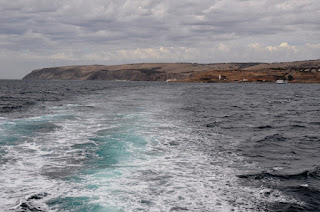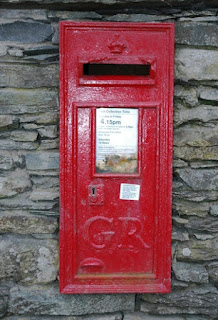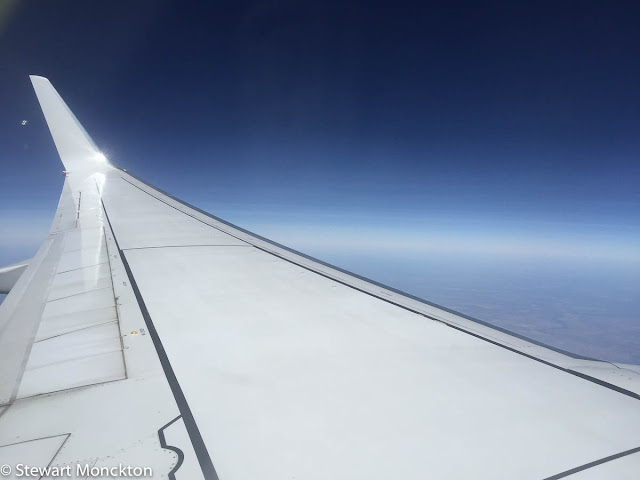On Arrival
Whoever said it is better to travel than to arrive never had to deal with the British motorway system on a bank holiday weekend. Or maybe they did – for there would be no hope for timely arrival, so embracing the joy of the journey is the only option. The classic 1970s holiday solution of setting up a picnic table by the side of the road makes perfect sense in these situations. A solution based on the austerity of a war that had ended in 1945, but still echoed through the thoughts and actions of people like my parents. The modern family would probably take a different approach. Selling coffee by the side of the road would have been a decent business plan when I think about it. Plane travel is no better and possibly much worse. Entertainment is provided not because it’s entertaining, but because the journey will be almost unbearable, even if it goes without hitch or delay. For a plane journey to be better than arrival you need to be sitting in the seats at the front of the plane and you need to be going somewhere very, very dull.
But on the occasion of migration excitement merges beautifully with anxiety until you can’t tell which is which and this takes the edge off the boredom, at least for an hour or two.
If you arrive by plane you often see nothing of your destination until you slide through the clouds and the world is revealed. In the rainy parts of the world you can be shockingly close to the ground when you first see it. A ground rush of legoland houses and roads, people’s backyards and gardens, a fly past over the everyday, the familiar and the seemingly safe. Then you have the bump touch of landing, sometimes soft, more often disconcertingly firm, followed by the rapid slow down. You are thrown forward in your seat by simple physics, the book end to the journey that started with you being pushed backwards; your body keen to leave its seat, so different to its apparent unwillingness at the start of the journey. An inertia to go and one to stay, but at the wrong ends of the journey. There is a sigh of relief from all, including the self consciously experienced, as the plane slows. An adrenaline rush followed by the long, long wait to leave the plane, and the subtle anxiety of the baggage claim – will it, won’t it, is that mine, no, yes, finally.
I prefer to arrive by boat. It still has an air of mystery that planes have lost. A gentler way to travel, where the journey may be part of the whole, rather than being something different and separate. Boats have the feeling of being in a strangely decorated house, rather than the badly disguised metal toilet roll of a plane’s interior. Sea sickness would be the only thing that could bring boat travel down to the hellish level of cattle class air travel – but thankfully I have only had to put up with that on a working boat, where I did not have kids to look after or excitement to contain. Being able to stand on deck, with the hope of whales or dolphins or seabirds, far exceeds the value any seat back entertainment system no matter how many channels it offers. One channel here, being better and more unpredictable than a dozen seat back ones. The blue green shape on the horizon slowly becomes clearer and larger, and soon it’s clear that it is land. Often it’s an island.
I had no idea how much the simple British countryside meant to me until I no longer had it, just outside the window, on the drive to work or on the walk to the pub. Whatever I knew about the world around me was based on the things I had seen for so many years, but now they were gone. Some post boxes were yellow; the police were armed, in some places you had to turn right by waiting in the left hand lane. Football was played on an oval pitch with a pointy ball, and the teams did not play each other twice a year. There were drive-through bottle shops, with cheap beer and cheaper wine, and at the same time the TV had gut wrenching advertisements saying “don’t drink and drive”. I recognised almost nothing. Trees kept their leaves all year, herbivores bounced on long legs and mammals laid eggs. The trees were full of parrots and the grass was full of snakes. There were spiders that could kill you under the lid of the compost bin. And each summer a few people would be eaten by sharks. The few things I could name or recognised were pests or weeds.
I felt shipwrecked, floating in a sea surrounded by random pieces of other people’s luggage. I grabbed anything that came to hand hoping it would keep me afloat. Sometimes it did, sometimes it was just baggage I would later have to discard. Slowly, gradually, I came to know more and more of this new world. The birds began to have names and the flowers too. Some beaches and woodlands became familiar, I came to think of some places as my local patch. And every time I looked around the same sheet anchor stood next to me, as she had stood next to me at the baggage claim and in that staff room so many years ago. She stood next to me when my brain started to fall apart and she helped me pick up the pieces and put it back together again. She helped me remake my brain.
As the neurones reconnected words tumbled from my fingertips. This was a huge shift from the derisory comments of school English classes, from embarrassed spelling and an anger that hurt all around me. Each new post pushed me further towards some kind of understanding and further from rage.
The swallows will be back next summer – well most of them anyway. They will have swum in a sea sky so much larger than even the continents and the oceans. I wonder, when they look down, do they notice the things that have changed? Changed for the better, changed for the worse. Do they only know the sky as a home, and the strange flat land below them some kind of other? Or do they come to see, as I have done, that the world around them has changed and that the past can never be refound, and that they have no option but to look into future and fly with all their might.
But on the occasion of migration excitement merges beautifully with anxiety until you can’t tell which is which and this takes the edge off the boredom, at least for an hour or two.
My last days as a resident in the UK were spent in the South Lakes, in a region that slowly becomes the limestone of north Lancashire. In the spring the grey of the exposed stone and the green of the new ash leaves make people pull over to the side of the road to stare and take pictures. It’s a region blessed with a scale that approaches the grand, but still manages to be intimate. The hedgerows behind our house were full of flowers in the spring and gave up four kinds of berries in the autumn. A walk at any time of the year or day yielded something new. I did not live there long enough for it to become repetitive.
The manner of your departure makes a huge difference to the way you begin to see and feel about the place of your arrival. A place of unremitting dullness may seem like Eden remade if you are fleeing from death and fear. I was not doing this. I was leaving a place I loved to travel to a place I did not know. It was a departure marked by conflicting emotion and confusion. The company you keep at such times can make a difference between giving in to fear or embracing the possibility of unknown hope. I did not choose fear, but I was not entirely convinced by hope either.
I prefer to arrive by boat. It still has an air of mystery that planes have lost. A gentler way to travel, where the journey may be part of the whole, rather than being something different and separate. Boats have the feeling of being in a strangely decorated house, rather than the badly disguised metal toilet roll of a plane’s interior. Sea sickness would be the only thing that could bring boat travel down to the hellish level of cattle class air travel – but thankfully I have only had to put up with that on a working boat, where I did not have kids to look after or excitement to contain. Being able to stand on deck, with the hope of whales or dolphins or seabirds, far exceeds the value any seat back entertainment system no matter how many channels it offers. One channel here, being better and more unpredictable than a dozen seat back ones. The blue green shape on the horizon slowly becomes clearer and larger, and soon it’s clear that it is land. Often it’s an island.
I arrived in Australia by plane. This is considered good form, as anybody who now arrives by boat, must, for reasons of political convenience and future electability, be considered suspect. I lost a season in a day. I left in winter and arrived in early summer. My birthday shifted from spring to autumn. I used to receive fishing tackle as a default birthday gift; a preparation for the long, slow days of summer. In the month between my birthday and the start of the fishing season I would dream of fish that rarely came. Now I receive books to read by the fire, gloves or red wine- warming gifts, indoor gifts to ward off the coming cold. The ancient fertility celebration that is Easter, long appropriated by the church has been shifted into the autumn. People fill up on chocolate eggs and rabbits in preparation for the winter, rather than in the anticipation of abundance. Christmas is in summer, but images of snow still fill shop windows. Fake snow lies deep and crisp and unmelting. At least I spoke the language, although even that bold assertion has been regularly challenged.
I spent most of that day sat on a plane, flying from the west coast of America to the east coast of Australia, passing over New Zealand. The first thing I did in Australia was to wait for my bags. I stood next to the only person I knew in the whole continent. A collision between two former strangers in a distant staff room had come, finally, to a surprise conclusion in the baggage claim area of Melbourne airport. Unlike swallows, my intention was not to return north on a regular basis. This was a different kind of migration, an arrival that marked an end as well as a beginning. The return of summer migrants is marked by celebration, by letters to The Times and a general feeling of well being. If I returned north as the seasons turned it would be with a heavy heart, and a sense of loss. Return in the spring would not be a marker that the world was still working, but an admission that something had broken.
I spent most of that day sat on a plane, flying from the west coast of America to the east coast of Australia, passing over New Zealand. The first thing I did in Australia was to wait for my bags. I stood next to the only person I knew in the whole continent. A collision between two former strangers in a distant staff room had come, finally, to a surprise conclusion in the baggage claim area of Melbourne airport. Unlike swallows, my intention was not to return north on a regular basis. This was a different kind of migration, an arrival that marked an end as well as a beginning. The return of summer migrants is marked by celebration, by letters to The Times and a general feeling of well being. If I returned north as the seasons turned it would be with a heavy heart, and a sense of loss. Return in the spring would not be a marker that the world was still working, but an admission that something had broken.
I had no idea how much the simple British countryside meant to me until I no longer had it, just outside the window, on the drive to work or on the walk to the pub. Whatever I knew about the world around me was based on the things I had seen for so many years, but now they were gone. Some post boxes were yellow; the police were armed, in some places you had to turn right by waiting in the left hand lane. Football was played on an oval pitch with a pointy ball, and the teams did not play each other twice a year. There were drive-through bottle shops, with cheap beer and cheaper wine, and at the same time the TV had gut wrenching advertisements saying “don’t drink and drive”. I recognised almost nothing. Trees kept their leaves all year, herbivores bounced on long legs and mammals laid eggs. The trees were full of parrots and the grass was full of snakes. There were spiders that could kill you under the lid of the compost bin. And each summer a few people would be eaten by sharks. The few things I could name or recognised were pests or weeds.
I felt shipwrecked, floating in a sea surrounded by random pieces of other people’s luggage. I grabbed anything that came to hand hoping it would keep me afloat. Sometimes it did, sometimes it was just baggage I would later have to discard. Slowly, gradually, I came to know more and more of this new world. The birds began to have names and the flowers too. Some beaches and woodlands became familiar, I came to think of some places as my local patch. And every time I looked around the same sheet anchor stood next to me, as she had stood next to me at the baggage claim and in that staff room so many years ago. She stood next to me when my brain started to fall apart and she helped me pick up the pieces and put it back together again. She helped me remake my brain.
As the neurones reconnected words tumbled from my fingertips. This was a huge shift from the derisory comments of school English classes, from embarrassed spelling and an anger that hurt all around me. Each new post pushed me further towards some kind of understanding and further from rage.
The swallows will be back next summer – well most of them anyway. They will have swum in a sea sky so much larger than even the continents and the oceans. I wonder, when they look down, do they notice the things that have changed? Changed for the better, changed for the worse. Do they only know the sky as a home, and the strange flat land below them some kind of other? Or do they come to see, as I have done, that the world around them has changed and that the past can never be refound, and that they have no option but to look into future and fly with all their might.






Comments
I love Australia dearly and miss it terribly when I am away but I miss so much of the Northern Hemisphere every day of my life. No matter how good life is here.
It is so difficult to leave the beloved famiiar and go to the unknown.
I love the mountains...beautiful every day...much more beautiful than what we left down south...cleaner, fewer people, no traffic...what's not to love? But I still miss the southland...we're going down less and less frequently, but we go down enough to still get a taste...